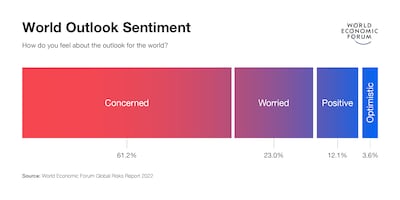Existential risks to the environment are rising exponentially above societal threats as perceived critical dangers over the next decade, the World Economic Forum annual risk survey has found.
Climate concerns and social stress compete alongside each other as the greatest perceived threats over the next two years, the Global Risks Report 2022 said. "All of the challenges were are currently facing are leading to a fairly pessimistic outlook," said Saadia Zahidi, WEF managing director. She said 84 per cent of the 1,000 high-level respondents to its perceptions survey were either worried or concerned about the outlook for the next decade.
In the immediate term the scars of Covid-19, a looming debt crisis, the consensus that the planet cannot wait, digital inequality and growing geopolitical rivalries cloud perceptions. The prospect of “climate action failure”, “extreme weather events” and “biodiversity loss” ranked as the top three fears. As the horizon expanded to look at threats for the next five to 10 years, the top five concerns are all environmental, the report said.
Those risks to the planet were compounded by worries over a lack of implementation of net-zero policy commitments and a potential failure of adaptation measures, and such fears were shared by many of the respondents.
“Over a 10-year horizon, the health of the planet dominates concerns,” the report said. “Environmental risks are perceived to be the five most critical long-term threats to the world, as well as the most potentially damaging to people and planet, with 'climate action failure', 'extreme weather events', and 'biodiversity loss' ranking as the top three most severe risks.
“[While] concern about environmental degradation predates the pandemic, increasing concern with climate action failure reveals respondents’ lack of faith in the world’s ability to contain climate change, not least because of the societal fractures and economic risks that have deepened."
Beyond environmental concerns, serious risks include livelihood crises, the erosion of social cohesion and an uneven pandemic recovery. A looming debt crisis means that there will be lower "fiscal firepower" to deal with some of these issues in the years ahead, the authors found.
The report says that growing social challenges will be exacerbated by the pandemic and experts gave a warning that global economic recovery is likely to be uneven and potentially volatile. As a as a result of the coronavirus pandemic, the global economy is projected to be 2.4 per cent smaller in 2024 than it would have been otherwise.
Ms Zahidi said employment was lower than before the pandemic, while advanced economies were undergoing far-reaching restructuring. She said unemployment was affecting a number of sectors in many parts of the world.
"So overall, there is an accelerated structural shift in labour markets that was long expected since the start of the Fourth Industrial Revolution, but has now been further accelerated because of the pandemic and its after-effects," she said.

Stakeholder capitalism means companies accepting increased responsibility for their effect on the societies in which they operate. The economic fallout of the pandemic and diverging recoveries also continue to jeopardise co-operation on other global challenges, at a time when climate and environmental problems loom large.
“The climate crisis remains the biggest long-term threat facing humanity," said Peter Giger, group chief risk officer of Zurich Insurance Group. "Humans are not good in the boiling frog scenario. They are good in the fight or flight scenario which we've seen in the pandemic but climate change is a boiling frog.
"Failure to act on climate change could shrink global GDP by one sixth and the commitments taken at Cop26 are still not enough to achieve the 1.5°C goal. It is not too late for governments and businesses to act on the risks they face and to drive an innovative, determined and inclusive transition that protects economies and people.”
chief risk officer at Zurich Insurance Group
Borge Brende, the president of the WEF, said the report suggests the cost of inaction far exceeds the cost of action.
“Most respondents instead expect the next three years to be characterised by either consistent volatility and multiple surprises, or fractured trajectories that will separate relative winners and losers,” the report said.
Growing dependence on digital systems has heightened the danger of digital or cyber security threats, and cyber security is expected to become a greater perceived threat. Many highly digitalised economies — such as the UAE, Denmark and Singapore — ranked cyber security failure as a top-five concern.
"Cyber attacks are not new but what we've seen is the intensification over the last two years means that cyber threats are now growing faster than our ability to prevent and manage them effectively," said Carolina Klint, the head of risk at insurer Marsh, one of the report's sponsors. "Companies trying to survive the pandemic had been under more pressure than ever to digitise and automate, but too often this has been built on the backbone of ageing technology, which has led to supply chain disruptions and greater exposure to cyber attacks and especially ransomware."

Increased activity in outer space is bringing its own challenges. "A greater number and range of actors operating in space could generate frictions if space exploration and exploitation are not responsibly managed," the report said.
"With limited and outdated global governance in place to regulate space alongside diverging national-level policies, risks are intensifying."
"Digitalisation and especially global communication is very dependent on space," Ms Klint said. "Space is closer than we might imagine, because all of those satellites that are orbiting above us are actually the reason that we can have global communication that is effective. And I think we're going to see increased political tensions now as different countries are really racing towards leveraging the opportunities that space presents."










